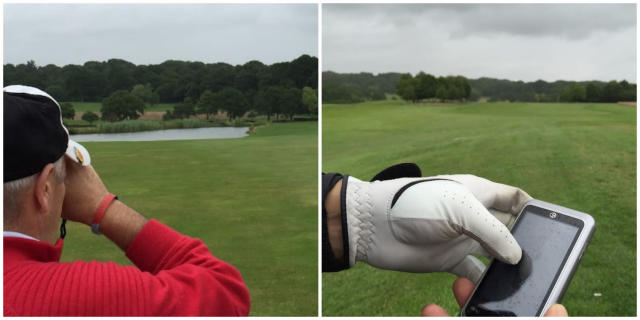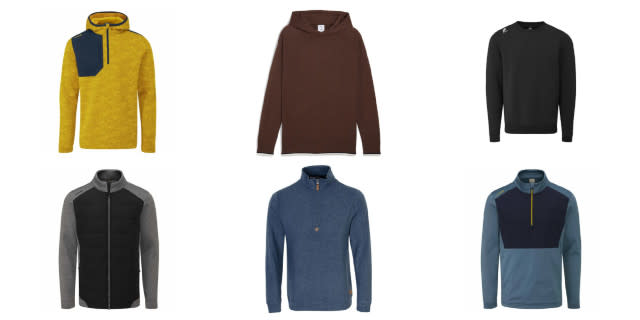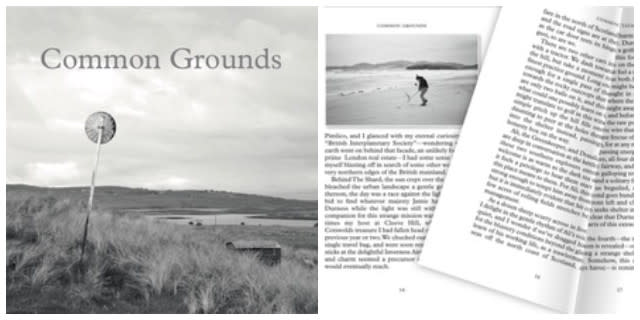
Why a GPS or Laser Range Finder Should Be The 15th Club In Your Golf Bag
THE way we play golf has changed forever.
Head out to play any golf course and the chances are that the people you are playing with will have some sort of device that tells them how far they are from the hole.
I have recently returned to golf after a long injury lay-off and still use the 150-yard markers to gauge my distance - but I am the first to admit that I am a dinosaur and need to move into the 2020s like every other man and woman I play this game with. I find myself increasingly asking my playing partners for an exact distance - and more often than not it leads to me taking one more club than I had in my hand.
There are all sorts of devices on the market. Some will simply tell you how far you have to go, while others allow you to record exactly how far you hit every club in the bag. To be honest, I accept that using a GPS device or laser range finder is a complete no-brainer.
And it is quite clear that most of you agree.
- Could This Be The Golf Device You Need To Lower Your Handicap
- What GPS Devices Do Golfers Use
- Should You Get A GPS or Laser Range Finder

Could This Be The Golf Device You Need To Lower Your Handicap
In our most recent survey, we wanted to find out what apps, services and devices you used for golf. With technology now playing such an important part in our everyday lives, it was no surprise to see the data backing up the benefits when it came to golf.
The use of GPS devices on the golf course continues to grow, from our research 80% of golfers own some form of GPS device. This figure is up from around 60% seven years ago, which highlights the continued importance of technology in golf. Furthermore, 45% said they owned a golf laser range finder. These are mind-boggling numbers and highlight the different way we now approach the game.
What stands out when we analyse the data further is which golfers are using a DMD (distance measuring device). 85% of mid-handicap golfers own a GPS and 78% of low-handicap golfers, compared to just 70% of high handicappers. Additionally, just 13% of high-handicap golfers own a laser range finder compared to 37% of mid-handicap golfers and more than two in three - 64% of low-handicap golfers own a laser range finder.

Can all of these golfers possibly be wrong? I don’t think so.
One of the big advantages of these devices is that not only will they tell you how far you have to the hole but they will also tell you how far you have to hit the ball to carry that lake in front of you.
Whilst it could be argued that high handicappers are likely to be newer to the game of golf and possibly spending money elsewhere, or waiting until they get the hook, the data suggests that if you want to improve then maybe think about purchasing some form of distance measuring device for golf.
Aged doesn't really play much of a factor but younger golfers are more likely to own a laser range finder.

What GPS Devices Do Golfers Use
The survey findings further backed up the importance of technology and in particular the Internet, with 33% of people surveyed stating that reading online reviews had helped when deciding on which product to buy. Being a past customer was vital for one in four people surveyed. When all is said and done, when we find a brand that we like, the chances are that we are going to stick with it.
But GPS devices are no longer just a physical individual device. The survey found a growing number of golfers accessing GPS data from their electric golf trolley with Motocaddy and Powakaddy both now offering premium models featuring integrated GPS functionality. Additionally, 33% of the respondents over the age of 45 stated that they used a GPS App on their phone - this figure rose considerably to 53% for those aged under 45.
In terms of which device to use, it will come down to individual preferences whether that is a GPS on your phone, integrated into an electric trolley, a small device you can attach to your golf trolley or drop in your pocket, a large handheld device offering full detailed hole visuals or a golf watch which serves multiple purposes. The variety for golfers is endless with a vast range of products and a price point to suit any budget.
One thing that is clear from our surveys, is that there is clearly one market leader when it comes to GPS devices.
59% of those stating that they owned a golf GPS device said they owned a Garmin device. The closest competitor was Bushnell with 15% and then the relatively new kid on the block Shotscope with 14%. It was also interesting to see some of the lesser-known brands with lower price points being mentioned such as Izzo & TecTecTec.
Should You Get A GPS or Laser Range Finder
So should you rush out and purchase a golf GPS over a laser range finder? This will come down to personal preference, what you want to use a device for, how much you are willing to pay, the accuracy you need and whether you need any additional functionality. My own experience is that almost all of the people I play with use a GPS device worn on their wrist.
Pros - Golf GPS
- Course Visual - Most devices feature some form of visual image providing details of the hole, hazards, green shape and possible course map/routing.
- Distance Options - GPS devices will not only provide simple data such as front, middle and back of the green but will often provide distances to hazards. Additionally, you may even be able to use the positioning functionality for any given location on a hole
- Easy of Use - Generally GPS devices simply require access to the GPS satellite data to provide data.
- Enhance Features - Many GPS devices include integration with smart watches, phones and offer additional functionality for tracking scores & stats.
- Portability - GPS devices come in all shapes and sizes; either wearable watches, pop in your pocket mini devices or all singing and all dancing large screen handheld units
Cons - Golf GPS
- Battery - You must remember to keep the device charged but most will last for several hours and easily cover a 36-hole golf day.
- Software - The device may require software updates or golf courses to be downloaded. Don't get caught out when playing a new golf course or going on a golf trip overseas.
- Subscription Fees - Watch out for any additional services that require a paid subscription update and any that require annual updates.
Pros - Laser Range Finders
- Accuracy - Pinpoint accuracy to the location usually within a yard.
- Ease of Use - Don't need software to load or be updated.
- One-Off Cost - No additional subscription fees.
Cons - Laser Range Finders
- Battery - Laser range finders will often require a battery to function but newer devices tend to include a rechargeable battery.
- Accuracy - you can only get a measurement if you can see it.
Related Articles
The Best GPS Golf Devices Under £150
Tags: laser range finder golf gps dmd distance measuring device daily picks












